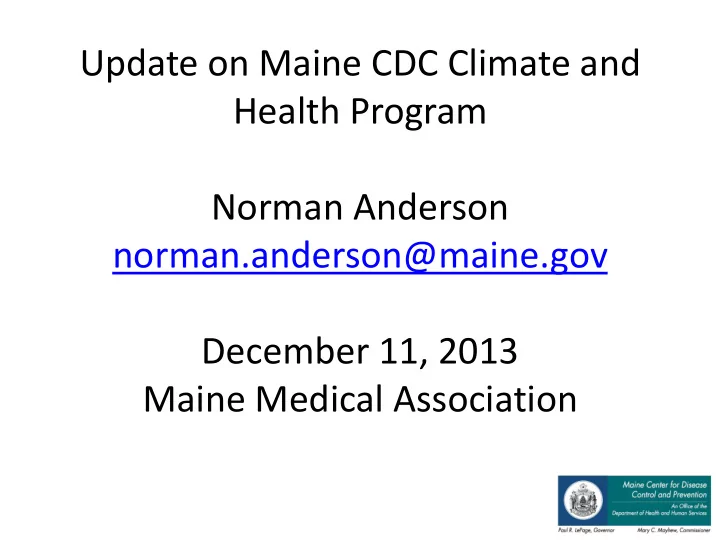

Update on Maine CDC Climate and Health Program Norman Anderson norman.anderson@maine.gov December 11, 2013 Maine Medical Association
Major Components of Maine’s Climate and Health Program • Part of Federal CDC Initiative • Current emphasis on • Identifying/assessing climate related health impacts • Projecting important climate indicators • Developing/enhancing intervention strategies
↑ Heat-related morbidity and mortality ↑ Vector-borne diseases (Lyme, EEE, West Nile) ↑ Air temperatures • Warmer winters ↑ Pollen, Ozone, • Hotter summers Particulates • More heat waves ↑ Asthma, Allergies, CVD CLIMATE CHANGE ↑ Frequency of severe ↑ Water storms, flooding temperatures ↑ Frequency of waterborne disease Outbreaks (Cryptosporidium, ↑ Precipitation E. coli, Giardiasis); Mold ↑ Algal blooms (Red tide, Cyanobacteria)
Relationship between High heats and Heat Illness ED Visits
ED and EMS: July, 2013 Heat Event ED Visits EMS Runs
Projected High Heat Days – Selected Weather Stations
Lyme Disease: Maine Distribution 2011 2010 2009 2008 2007 2006 2005 Lyme disease is becoming more widespread
Correlation between Deer Tick Prevalence and Lyme Disease
By Mid Century, Conditions will be favorable to deer tick spread throughout Maine
Interventions • Public Health/Emergency Preparedness – Hazard Vulnerability Assessments – All hazards planning • Cumberland County Pilot Heat Response Plan • Lyme Disease Forums/Needs Assessments • Educational Interventions Vector borne disease prevention in Maine Schools
Next Steps • Continue development of heat response and vector borne disease prevention strategies • Expand scope of project to address impacts of extreme precipitation and pollen • Increase emphasis on water-borne diseases
National Research Council, 2013 • Significant climate impacts predicted for this century could happen abruptly (e.g., several years) • Even gradual changes in the physical environment could cross critical thresholds in human and ecological systems (e.g., crop failures, mass extinctions) • We are not prepared for what lies ahead – Recommends an abrupt change early warning system
Recommend
More recommend